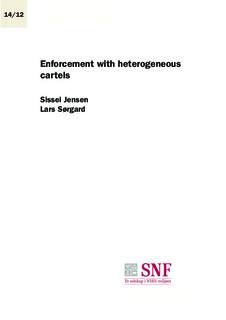| dc.description.abstract | The purpose of this article is to analyze the minimum fines needed in order to prevent price fixing when there is heterogeneity in the potential for a cartel overcharge across industries. We show that the incentive constraint is typically binding in industries where cartels would lead to a high overcharge, while the participation constraint is typically binding in industries where the potential for overcharge is rather low. We show that a discriminatory fine should depend on the probability of detection, the discount factor and the gains from cartel deviation. We contrast our minimum fine schedule with the one we can derive from judicial practice, a fine schedule that is proportional to the gain in per period profits. Furthermore, it is shown that more private litigation can make the most harmful cartels more stable, while cartels with lower negative impact can become less profitable. | no_NO |
